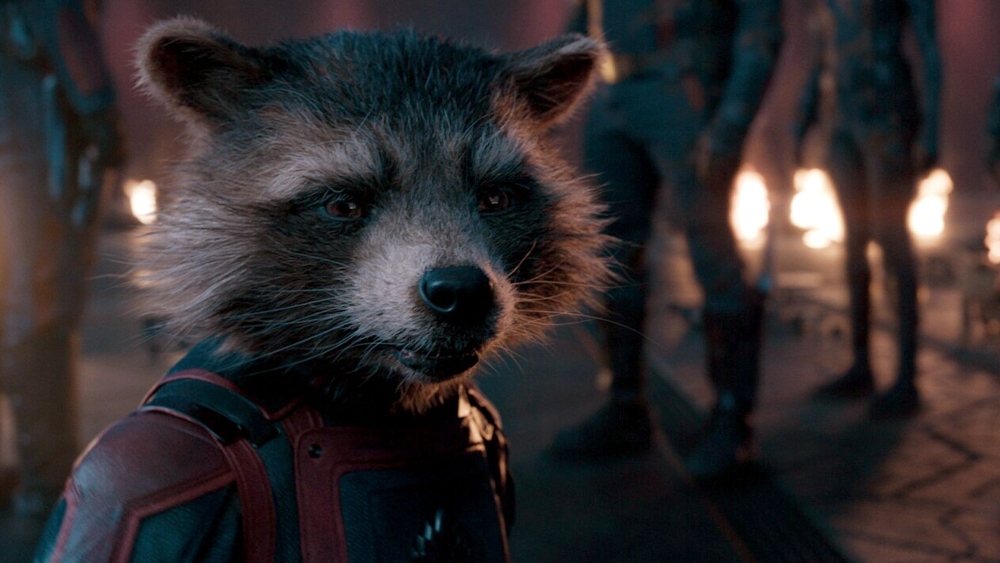Scientists recently reminded lowly humans that all traces of our existence will be gone in five billion years. But the fine print exempted from erasure may be the Marvel Cinematic Universe — which is infinite, unstoppable, and everlasting.
For its whopping 32nd installment, it offers the purported concluding chapter of one of its subparts, Guardians of the Galaxy Vol. 3. Like most of its more recent MCU brethren, Guardians is a bridge between one set of characters (many of whom have died and returned somehow) and the next group of maladroit heroes who will take over the cash cow franchise. But in the real world — as in the superhero one — immortality has a price. Here, that price is to have all semblance of an original soul sucked out of Guardians, since none of the cute suffering animals that fill the film can breathe life back into it.
When we first encounter this particular band of misfits, Peter Quill (Chris Pratt) is still depressed from the loss of love interest Gamora (Zoe Saldaña), who was thrown off a cliff by her stepfather, Thanos, so he could gain access to a mythical stone that would permit him to snap away half of humanity. But this being the consequence-free MCU, the Gamora from 2014 was magically brought back to the present. Quill ignores this for the time being, as the Gamora from 2014 did not live the part of her life where she fell in love with him, allowing Writer-Director James Gunn to set up cutesy, amnesiac encounters between them to help jog her memory, if you want to call it that (it’s really our memory).
Soon after this encounter, the Guardians — which include Dave Bautista as Dax the Destroyer, Karen Gillian as Gamora’s morose sister Nebula, Vin Diesel as the beloved tree Groot, and Bradley Cooper as the genetically-engineered raccoon Rocket — are attacked. Rocket is left lifeless, with an electronic device at the center of his soul his only hope. The perpetrator this time around is the so-called High Evolutionary, played by Chukwudi Iwuji as a narcissistic, simpleminded sociopath who plays eugenics with cute little creatures. The Guardians must race against time to find him, stop him, and bring their furry, foul-mouthed little friend back to life. The bad guys also include a speaking role for the hilariously amusing Maria Bakalova as Cosmo the Spacedog, Elizabeth Debicki as Ayesha, and a snarling Will Poulter as Adam Warlock.
This setup should immediately make obvious Guardians’ principal problem — the staleness of this franchise and its understandable but still troubling lack of originality. Rocket’s lifeline is essentially the same one that saves Iron Man all the way back in the MCU’s first movie. The Evolutionary’s conceit is Nazi-like, just like, well, essentially every Marvel villain’s. The story’s arc is predictable and lifeless — no consequences beyond the passing of the guard, and not because characters can actually die or move on, but because the actors and the screenwriters have.

Like other movies in the franchise, Guardians 3 features excellent production values all around. Beyond the VFX (which are the entire movie), the biggest lift is for Editor Fred Raskin, who continues doing a good job giving the Guardians movies the playful and fast-clipped pace that characterizes them. Beth Mickle and Judianna Makovsky respectively continue their colorful production and costume design work that tricks you into thinking you grew up watching these characters on screen in the ’80s. John Murphy’s humorous score is also a good fit for the mostly lighthearted nature of this film, though there are times when it’s very emotional as well.
It’s weird to sit through 150 minutes of what is an expertly crafted movie, gifted with a talented, exemplary cast, and not enjoy it. If I watched Vol. 3 on a standalone basis and divorced it from the other 31 movies that make up the MCU, it would be a perfectly entertaining blockbuster to kick off the summer movie season. But movies weren’t meant to be enjoyed like TV shows, with storylines that go on indefinitely.
Though Disney and Marvel have admittedly revolutionized the reasons audiences pay to watch a film in theaters, we were not meant to spend 100+ hours with the same characters on the big screen. The banality of repetition that comes with feeling like you know those characters so intimately is best suited for television, where shorter bursts of information break up the monotony and where some structural repetition is not only expected but required.
In the context of the film, however, returning to the well this many times — as if this were just another edition of the comic book — is entirely ruinous. Gunn and his talented team of film stars try to avoid this outcome by emotionally manipulating the audience with repeated scenes of tortured, crying animals. But while having an emotional core is certainly better than the utter staleness of recent entries in Phase Five of the MCU, it’s still not enough. Something new, something consequential is needed, but Marvel and Gunn know they need not provide any of that to get audiences back in their seats.
“With great power comes great responsibility,” is the oft-repeated line in one of Marvel’s most beloved and profitable superhero stories. Does Marvel itself understand that? They alone, seem to be able to consistently and persistently yield the power to bring audiences back to the theaters. Do they understand the responsibility to the greater cinematic industry that this entails? Surely, they care about nurturing the goose that is laying the golden eggs. The question then, is, whether they will realize the urgent need for something more consequential before it is too late and they, too, are improbably wiped away from the universe with the rest of us mere mortals.
Grade: C+
Guardians of the Galaxy Vol. 3 is now playing in theaters nationwide courtesy of Disney and Marvel Studios.





